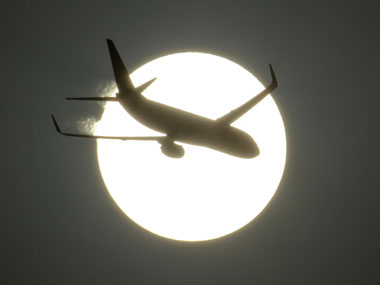New Delhi: The Budget announcements have not really brought great cheer to India’s bleeding airlines. One of the sector’s main demands, allowing foreign airlines to invest in Indian carriers, is still pending with the government. Finance Minister Pranab Mukherjee’s assurance that the government was “actively” considering the issue failed to soothe frayed nerves in the sector.
Kingfisher Airlines, which is perhaps on a wing and a prayer now due to severe financial stress, is holding out only in the hope that foreign airlines are allowed to invest in India airlines. As per some estimates, the Indian airlines are together mired in whopping $20 billion debt. The only saving grace in today’s Budget announcements was the proposal to allow airlines to raise working capital loans up to about Rs 5,000 crore ($1 bllion) through external commercial borrowings.[caption id=“attachment_247385” align=“alignleft” width=“380” caption=“Bleeding and flying. Reuters”]  [/caption]
This step, though unlikely to widely alter the fortunes of airlines, will help them lower their overall interest costs on working loans to a small extent. Working capital loans account for a significant portion of the airlines’ debt. Air India alone needs between Rs 22,000-24,000 crore working capital loans each year in an overall debt burden of Rs 45,000 crore. Speaking to Firstpost, a senior airline official said this step would generate considerable savings for airlines since borrowings abroad “can refinance rupee working loans and ECB permission could mean 6-7 percentage points savings in interest costs”.
Then, Jet Airways recently sought government intervention in getting Rs 1,000 crore working capital loan at reduced costs from banks. And Kingfisher Airline’s struggle for survival is well known - the airline needs not only urgent equity infusion but also working capital loans.
KPMG’s Amber Dubey welcomed the move to allow an ECB limit of a billion dollars for working capital for airlines. “Preliminary estimates are that this may save 150-300 basis points for working capital loans for airlines. Key challenges would be the banks’ reluctance to lend to the sector and the hedging costs.”
On the FDI dampener, Dubey said, “The industry was expecting that this be announced as accepted policy.”
Mukherjee’s intention to impose retrospective taxation on sale of equity may send out wrong signals to global investors in the airline sector though, specially when the sector is out wooing foreign airlines for equity deals. But the proposed exemption of basic customs duty on aircraft spares is a welcome move, since it would encourage the MRO (Maintenance, Repair Overhaul) segment of airlines.
Another fallout of today’s budget proposals could be an increase in fares, since service tax has been increased which will make airline industry overheads such as advertising, utilities, rents etc costlier. Already, jet fuel prices have been raised after global crude prices increased in the last few days.


)
)
)
)
)
)
)
)
)



